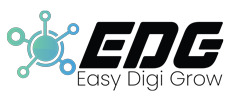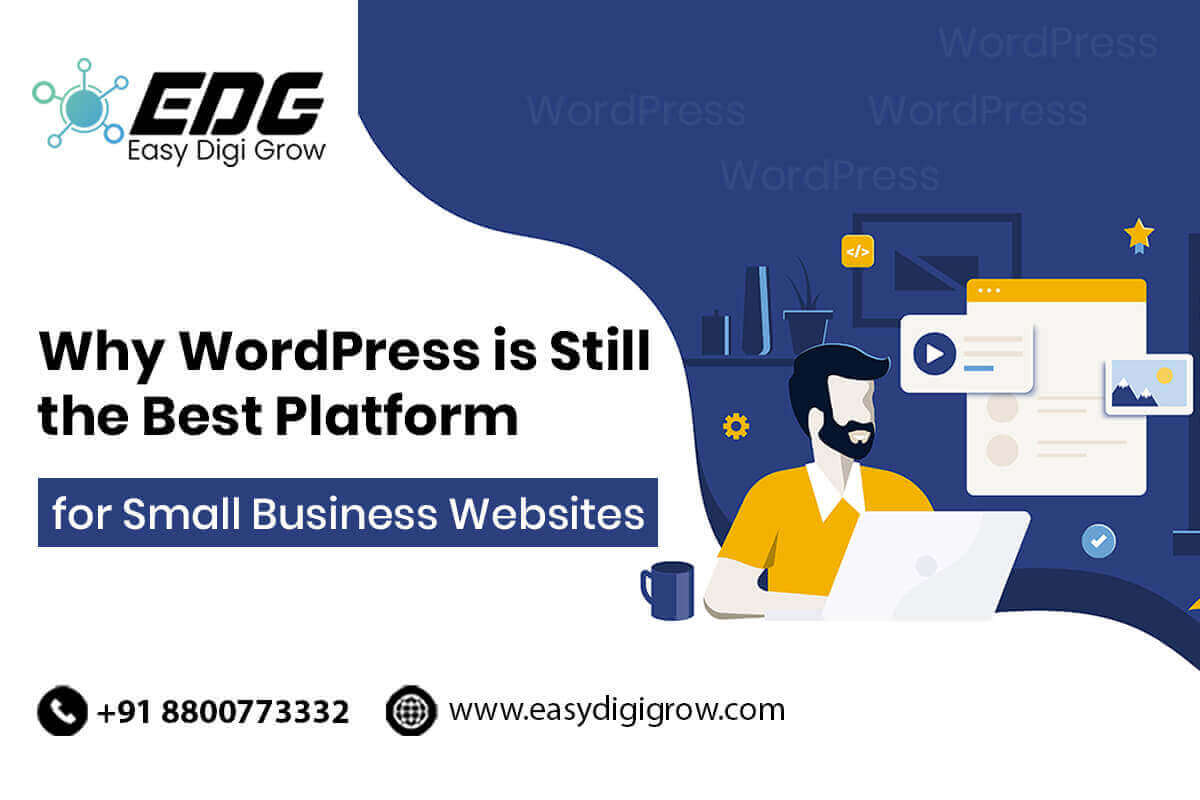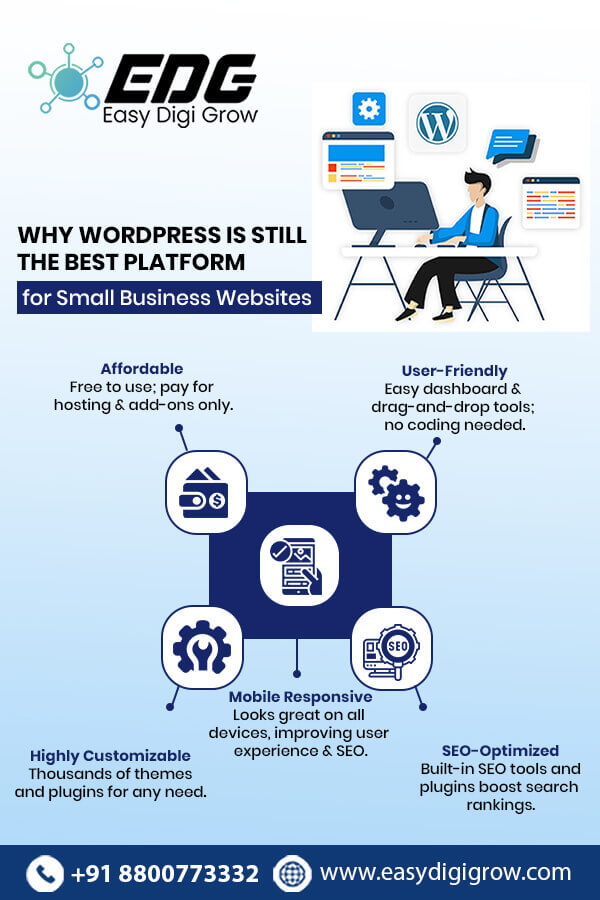In today’s digital era, having an online presence is essential for any small business. With so many website platforms available, it may be difficult to make a decision. However, WordPress is still the most popular and reliable platform for small businesses to develop an online presence. It is adaptable, scalable, and user-friendly, making it an excellent choice for small enterprises. In this blog, we’ll look at why WordPress is still the best platform for small business websites, including its importance, benefits, and key features that set it apart.
Importance of WordPress for Small Businesses
Small businesses must have a strong online presence to compete in the digital marketplace. Your website frequently serves as a first impression for potential consumers, and WordPress allows small businesses to create appealing, feature-rich websites without having to hire expensive developers.
The simplicity and flexibility of WordPress make it useful even for business owners who do not have technical experience. Whether you want to create a blog, an e-commerce store, or a service-based website, it has many tools and plugins that can help you. Furthermore, WordPress runs more than 40% of the world’s websites, and it provides an extensive developer community and resources to assist small businesses succeed online. Its robust support and documentation make it a perfect platform for small businesses looking to grow and scale.
Benefits of Using WordPress for Small Businesses
Cost-Effective
Affordable pricing is a major benefit of WordPress. It is an open-source platform and completely free to use. You are only required to pay for hosting, domain registration, and optional premium themes or plugins. It is cost-effective for small businesses who want a professional website without spending much.
The cost-effectiveness remains beyond the first setup. WordPress is simple to administer, allowing small business owners to undertake routine upgrades and content management without the need for a full-time developer. This can reduce long-term operational costs.
User-Friendly
WordPress has a simple and user-friendly dashboard, making it accessible to people with no technical expertise. With drag-and-drop page builders such as Elementor and WPBakery, the options are presented directly, so even users can make appealing pages without writing even a single line of code.
Because of this ease of use, small business owners can easily update their websites, add new products, or change information, giving them complete control over their online presence. It also reduces the need for external web developers, reducing costs even further.
Customizability
WordPress provides amazing customization options. With so many free and premium themes available, small businesses may select one that fits their branding. If your company expands or changes direction, you may quickly modify or adjust the theme to fit your evolving requirements.
WordPress has over 50,000 plugins available to extend the functionality of your site. It includes e-commerce solutions like WooCommerce and SEO plugins like Yoast, enabling small businesses to add features without requiring complex development.
SEO-Friendly
WordPress is known for its SEO-friendliness. It can offer clean and optimized HTML code, which search engines like Google can readily crawl. Additionally, SEO plugins such as Yoast SEO and RankMath assist small business owners in optimizing their content, meta descriptions, and titles, hence enhancing their search engine ranks.
SEO brings organic traffic to small businesses. Chances of more sales and conversion are increased as a result.
Mobile-Responsive
Mobile-responsive websites are essential in a mobile-driven environment. Fortunately, most WordPress themes are mobile-friendly, so your site will look great on phones and tablets. Mobile responsiveness enhances the user experience while also contributing to greater search engine rankings, as Google considers mobile-friendliness when determining rankings.
Key Features of WordPress for Small Businesses
Plugins for Every Function.
An important advantage of WordPress is its vast library of plugins. Plugins extend the functionality of your website, allowing small businesses to add important features without significant requirements in terms of coding. If one needs a contact form, enable sharing from social networks, or add email marketing tools, there’s a plugin for that.
Plugins like WooCommerce transform WordPress into a robust e-commerce platform, while WPForms allows you to develop stunning contact forms in minutes. For small firms, the ability to easily add key functionality is invaluable.
E-commerce Integration with WooCommerce
WordPress works smoothly with WooCommerce, the most popular e-commerce platform in the world, for small enterprises that sell items or services online. WooCommerce offers a variety of customizable features, including product listings, payment channels, and delivery options.
The ability to convert your WordPress site into a fully functional online store makes it an excellent alternative for small businesses wishing to sell products online. WooCommerce also provides several plugins that enable you to increase your store’s capabilities as your business expands.
Security Features:
WordPress takes security very seriously, and with frequent updates, security upgrades, and dedicated security plugins, it remains a secure platform for small business websites. Plugins such as Wordfence and Sucuri provide additional layers of protection against hackers and viruses.
Security is a critical responsibility for small businesses that handle sensitive client data, such as payment or personal information. WordPress allows you to keep your site secure by updating it and utilizing trusted security plugins.
Analytics & Reporting
Understanding how your website performs is essential for growth. WordPress works well with Google Analytics and other analytics tools, so small business owners can keep an eye on things like website traffic, user behavior, and other important data. There are apps like MonsterInsights that make it easy to get information from Google Analytics from your WordPress dashboard.
This information helps small businesses make smart choices about how to improve their websites, how to market them, and how to add new content.
Community Support and Documentation
WordPress‘s strong community support is another important benefit. It has a wide developer and user team that work together to make it better. If you need help with your website or want to try out new features, there are plenty of tutorials, groups, and professional support available.
Community support is an important advantage for organizations that do not have a professional web development team. It is possible to easily troubleshoot problems or find ways to improve the website by having thorough documentation and guides.
Conclusion
In conclusion, WordPress remains the best solution for small company websites due to several major benefits. It’s extremely adaptable, changing from a simple blog to a full-featured e-commerce website as your company grows. Additionally, it also has a low cost, including affordable hosting prices and great features, making it an economically effective option. WordPress’s built-in SEO tools and mobile-responsive themes will help your site rank higher in search results and look amazing on all devices. Its considerable customization options, like themes and plugins, allow businesses to create distinctive and branded websites. Regular updates and security enhancements keep your site current and secure. Overall, WordPress offers the flexibility, affordability, and ease small businesses need to succeed online.
 seolounge
seolounge



